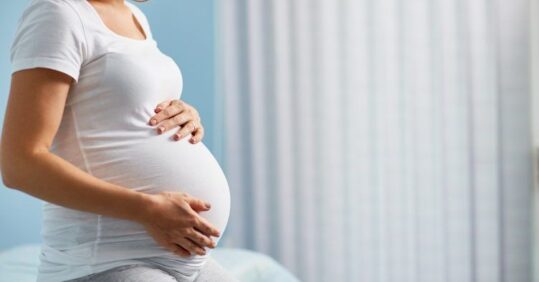Covid vaccine uptake rises among pregnant women but inequalities remain

Covid vaccine uptake among pregnant women is increasing but black women and women from deprived areas in England remain the least likely to be vaccinated, the latest UK Health Security Agency (UKHSA) data shows.
However, just 31% of black pregnant women had one or more doses of the vaccine by the time their baby was delivered between November 2021 and January 2022, compared to 58% of white women.
Only 39% of pregnant women in the most deprived areas of England had received one or more doses of the vaccine before delivery in the same time frame, compared to 71% in the least deprived areas.
Related Article: ‘Concerning acceleration’ in drug-resistant gonorrhoea ahead of vaccine programme
The UKHSA warned: ‘Despite the upward trend in the number of pregnant women coming forward, women of black ethnicity and those living in the most deprived areas of England remain the least likely to be vaccinated.’
The latest figures take the total number of pregnant women who have received at least one dose of the Covid vaccine, between January 2021 and January 2022, to 125,365. In the same time period, 88,736 pregnant women received at least two doses and 14,378 women received three doses.
The data also found that 51% of women had received two doses of the vaccine in January – up from 43% in December 2021 and 38% in November 2021.
Dr Gayatri Amirthalingam, deputy director of the Immunisation and Vaccine Preventable Diseases Division at UKHSA, said it is ‘very encouraging’ to see ‘the number of pregnant women coming forward for their Covid-19 vaccine increasing month by month.’
She continued: ‘We know pregnant women are at higher risk of severe disease and the Covid vaccines provide high levels of protection against becoming seriously unwell and hospitalised.
‘However, disparities in uptake persist, with women from some ethnic groups and those living in the most deprived areas being the least likely to be vaccinated. It is vitally important that we continue to address these disparities.’
Related Article: Action needed to tackle untreated hearing loss in care homes
Dr Amirthalingam pointed to ‘extensive evidence’ globally ‘supporting the safety of the currently recommended Covid vaccines for pregnant women’.
She added: ‘We continue to encourage all pregnant women to come forward for vaccination to give themselves and their baby the best possible protection against severe complications from Covid-19.’
Head of the NHS Covid-19 vaccination programme, Steve Russell, said the increasing number of pregnant women opting to get vaccinated is ‘really positive’ and that ‘the NHS has been clear that getting protected is the best thing you can do if you are pregnant.’
He added: ‘Whether your next dose is your first or fourth, the NHS vaccine programme offer is evergreen and you can come forward at any time, with local healthcare professionals happy to address any concerns you may have.’
Related Article: Government to introduce HPV self-sampling for ‘under-screened’ women

See how our symptom tool can help you make better sense of patient presentations
Click here to search a symptom




